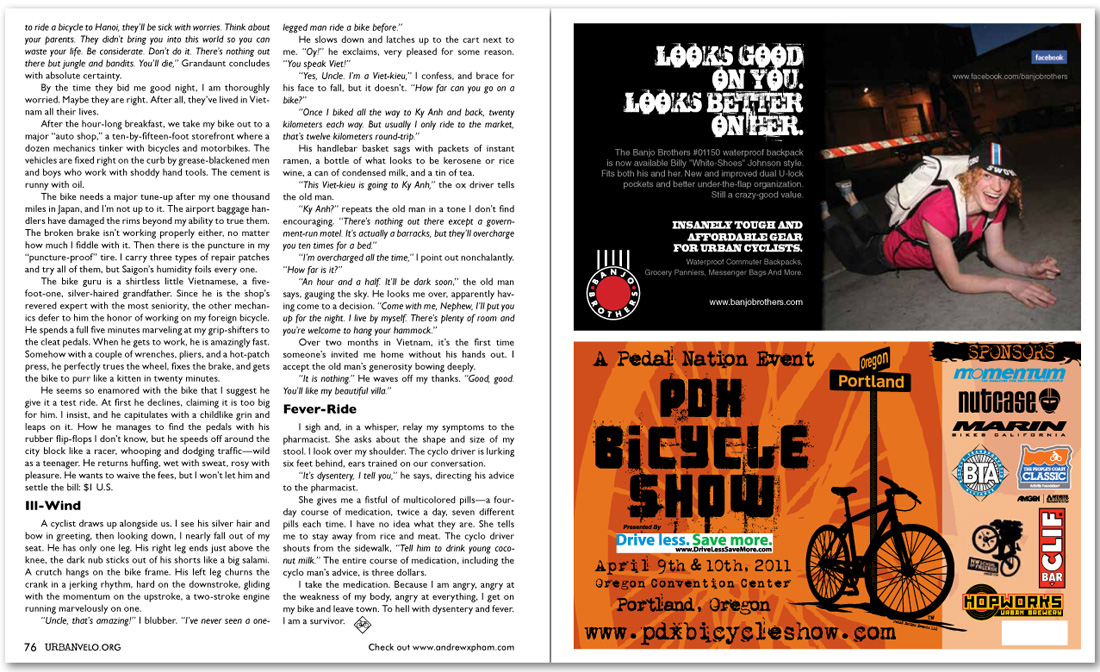


to ride a bicycle to Hanoi, they’ll be sick with worries. Think about your parents. They didn’t bring you into this world so you can waste your life. Be considerate. Don’t do it. There’s nothing out there but jungle and bandits. You’ll die,” Grandaunt concludes with absolute certainty.
By the time they bid me good night, I am thoroughly worried. Maybe they are right. After all, they’ve lived in Vietnam all their lives.
After the hour-long breakfast, we take my bike out to a major “auto shop,” a ten-by-fifteen-foot storefront where a dozen mechanics tinker with bicycles and motorbikes. The vehicles are fixed right on the curb by grease-blackened men and boys who work with shoddy hand tools. The cement is runny with oil.
The bike needs a major tune-up after my one thousand miles in Japan, and I’m not up to it. The airport baggage handlers have damaged the rims beyond my ability to true them. The broken brake isn’t working properly either, no matter how much I fiddle with it. Then there is the puncture in my “puncture-proof” tire. I carry three types of repair patches and try all of them, but Saigon’s humidity foils every one.
The bike guru is a shirtless little Vietnamese, a five-foot-one, silver-haired grandfather. Since he is the shop’s revered expert with the most seniority, the other mechanics defer to him the honor of working on my foreign bicycle. He spends a full five minutes marveling at my grip-shifters to the cleat pedals. When he gets to work, he is amazingly fast. Somehow with a couple of wrenches, pliers, and a hot-patch press, he perfectly trues the wheel, fixes the brake, and gets the bike to purr like a kitten in twenty minutes.
He seems so enamored with the bike that I suggest he give it a test ride. At first he declines, claiming it is too big for him. I insist, and he capitulates with a childlike grin and leaps on it. How he manages to find the pedals with his rubber flip-flops I don’t know, but he speeds off around the city block like a racer, whooping and dodging traffic—wild as a teenager. He returns huffing, wet with sweat, rosy with pleasure. He wants to waive the fees, but I won’t let him and settle the bill: $1 U.S.
Ill-Wind
A cyclist draws up alongside us. I see his silver hair and bow in greeting, then looking down, I nearly fall out of my seat. He has only one leg. His right leg ends just above the knee, the dark nub sticks out of his shorts like a big salami. A crutch hangs on the bike frame. His left leg churns the crank in a jerking rhythm, hard on the downstroke, gliding with the momentum on the upstroke, a two-stroke engine running marvelously on one.
“Uncle, that’s amazing!” I blubber. “I’ve never seen a one-legged man ride a bike before.”
He slows down and latches up to the cart next to me. “Oy!” he exclaims, very pleased for some reason. “You speak Viet!”
“Yes, Uncle. I’m a Viet-kieu,” I confess, and brace for his face to fall, but it doesn’t. “How far can you go on a bike?”
“Once I biked all the way to Ky Anh and back, twenty kilometers each way. But usually I only ride to the market, that’s twelve kilometers round-trip.”
His handlebar basket sags with packets of instant ramen, a bottle of what looks to be kerosene or rice wine, a can of condensed milk, and a tin of tea.
“This Viet-kieu is going to Ky Anh,” the ox driver tells the old man.
“Ky Anh?” repeats the old man in a tone I don’t find encouraging. “There’s nothing out there except a government-run motel. It’s actually a barracks, but they’ll overcharge you ten times for a bed.”
“I’m overcharged all the time,” I point out nonchalantly. “How far is it?”
“An hour and a half. It’ll be dark soon,” the old man says, gauging the sky. He looks me over, apparently having come to a decision. “Come with me, Nephew, I’ll put you up for the night. I live by myself. There’s plenty of room and you’re welcome to hang your hammock.”
Over two months in Vietnam, it’s the first time someone’s invited me home without his hands out. I accept the old man’s generosity bowing deeply.
“It is nothing.” He waves off my thanks. “Good, good. You’ll like my beautiful villa.”
Fever-Ride
I sigh and, in a whisper, relay my symptoms to the pharmacist. She asks about the shape and size of my stool. I look over my shoulder. The cyclo driver is lurking six feet behind, ears trained on our conversation.
“It’s dysentery, I tell you,” he says, directing his advice to the pharmacist.
She gives me a fistful of multicolored pills—a four-day course of medication, twice a day, seven different pills each time. I have no idea what they are. She tells me to stay away from rice and meat. The cyclo driver shouts from the sidewalk, “Tell him to drink young coconut milk.” The entire course of medication, including the cyclo man’s advice, is three dollars.
I take the medication. Because I am angry, angry at the weakness of my body, angry at everything, I get on my bike and leave town. To hell with dysentery and fever. I am a survivor.